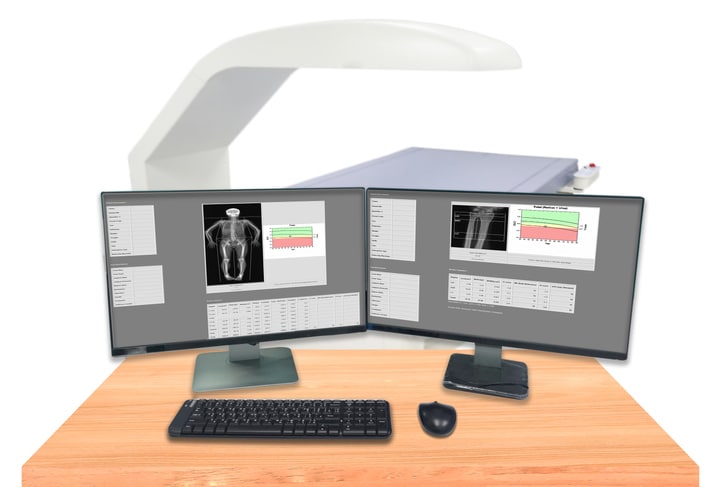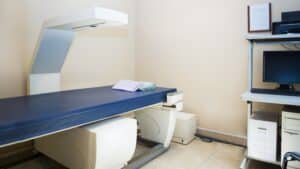
A DEXA (Dual-Energy X-ray Absorptiometry) scan is well-known and highly regarded for its detailed assessments of bone health. Most of us have heard of it, and many have had one. But there’s far more to a scan than bone density, and it’s not just for people above a certain age.
An intriguing development in healthcare and technology, DEXA scans are emerging as a comprehensive evaluator of body composition. This promising transformation reflects a broader shift in healthcare towards more personalized, data-driven approaches, with DEXA scans at the forefront, offering detailed insight into our physical status at a relatively accessible cost – around $40, depending on location.
This intersection of affordability and advanced diagnostic capability marks a significant milestone in healthcare technology, making sophisticated and preventive health assessments more accessible to a broader audience.
I recently had one as part of a preventive health care plan and learned a lot in the process of it. The scan’s ability to show precise body fat measurements, lean muscle mass, and bone density opens new avenues for understanding and managing health.

This deep dive into the body’s composition provides a better picture of your health and the steps you can take to improve it. Here’s what it can do for you!
1. Body Fat Analysis
DEXA scans provide one of the most accurate body fat measurements, distinguishing between subcutaneous fat (under the skin) and visceral fat (around the organs).
This precise breakdown is vital for understanding health risks, as high levels of visceral fat are linked to chronic conditions such as heart disease, diabetes, and certain cancers.
Interestingly, even thin people in seemingly good shape can have high levels of visceral fat without knowing so. The key to reducing it? Resistance training.
2. Muscle Mass Distribution
Athletes and fitness lovers benefit from DEXA scans by accurately assessing lean muscle distribution across their bodies. This information is crucial for tailored training and nutrition plans to optimize performance and achieve specific fitness goals.
My scan showed that I’m significantly underweight and under-muscled. While the first one was no surprise, I thought I was doing pretty good on the second. Fortunately, working on the second should help with the first.
3. Monitoring Weight Loss
DEXA scans provide more than just a number on a scale. They allow for monitoring of how much fat is lost compared to muscle, offering a clearer picture of health improvements and the effectiveness of diet and exercise regimens.
4. Health Risk Assessment
The detailed composition analysis from scans helps assess risks associated with obesity and underweight conditions. By identifying fat distribution patterns and bone density, healthcare providers can better predict risks for metabolic syndromes, cardiovascular diseases, and other health issues.
5. Tracking Changes Over Time
DEXA scans are invaluable for tracking changes in body composition over time, whether for monitoring the impact of a new training program, the progression of a health condition, or the effectiveness of a treatment plan. This longitudinal analysis helps make informed decisions about lifestyle modifications and medical interventions.
I will probably do another in about six months after I’ve had time to improve my fitness routine. It’s the ultimate before-and-after but with the beauty of scientific details. Perfect for those who love to measure every milestone or for anyone curious if their new kale smoothie diet is actually doing anything.
6. Nutritional Assessment
Nutritionists and dietitians may use DEXA scans to tailor dietary plans. By understanding the proportions of fat, muscle, and bone, they can recommend nutrition plans that target specific body composition goals, such as increasing muscle mass or reducing body fat.
7. Research and Clinical Studies
In clinical research, DEXA scans contribute to studies on obesity, aging, pediatric growth, and chronic diseases. They provide accurate and repeatable measurements crucial for understanding health conditions and the impact of functional medicine and treatments on body composition.
8. Personal Health and Fitness Insights
Beyond professional athletes and patients, people interested in personal health also turn to DEXA scans for insights into their physical condition. This can motivate lifestyle changes, improve fitness planning, and enhance overall well-being. This is me to a T.
Beyond the pros, these scans are for anyone curious about their body’s secrets. It’s like getting a roadmap to a better you, one X-ray at a time.

The comprehensive data provided by my DEXA scan not only revealed unexpected aspects of my health but also catalyzed a significant shift in my approach to fitness.
Moving from a general focus on strength training to a more targeted emphasis on building muscle mass, I’m inspired to address the specific needs identified through my scan. I will emphasize increasing lower body muscle mass because that’s where it’s lowest.
My experience is just one of many examples highlighting the benefits of DEXA technology in personal health management – its ability to inform, motivate, and guide us toward healthier lifestyles.
Let’s Have a Conversation:
What are your thoughts on the accessibility and affordability of DEXA scans? If you’ve undergone a body composition DEXA scan, how did the results shape your health or fitness strategy?





